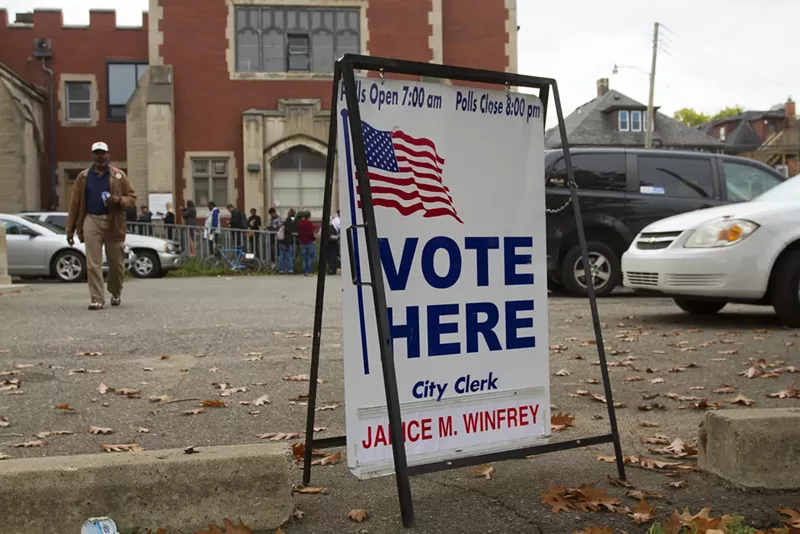
Audio By Carbonatix
[
{
"name": "GPT - Leaderboard - Inline - Content",
"component": "35519556",
"insertPoint": "5th",
"startingPoint": "3",
"requiredCountToDisplay": "3",
"maxInsertions": 100,
"adList": [
{
"adPreset": "LeaderboardInline"
}
]
}
]

Steve Neavling
Polling station in Detroit.
The Michigan Senate on Wednesday narrowly approved controversial legislation that would impose stricter ID requirements to vote.
The Senate voted along party lines – 19-16 – to require voters to submit a photocopy of their driver’s license or state ID card or the last four digits of their social security number to request an absentee ballot.
All 19 Republicans also approved a bill to require voters to show their driver’s license or state ID to cast a ballot in person. Under the current law, voters who don’t have access to a photo ID can sign an affidavit attesting to their identity.
The new legislation would ban the use of affidavits and instead require voters to sign a provisional ballot, which would only be counted if voters present their ID to their local clerk’s office within six days of the election.
The legislation is part of a larger 39-bill package that would curtail voting access, impose restrictions on absentee ballots, limit the secretary of state’s ability to assist voters, and make it easier for political appointees to overturn elections.
Democrats denounced the bills as a coordinated, nationwide voter-suppression campaign in the wake of the 2020 election. The legislation, they said, would disproportionately harm voters of color and make it harder to cast a ballot.
“The most fundamental right we have is to vote,” Sen. Adam Hollier, D-Detroit, said on the Senate floor. “It should be easy.”
The bills were introduced after former President Donald Trump and his supporters falsely claimed the 2020 election was riddled with fraud.
Sen. Curtis Hertel Jr., D-East Lansing, said the bills are clearly a response to a record number of voters turning out and voting for Democrats.
"The Right likes to talk about liberal snowflakes and participation trophies,” Hertel said before the vote. “But I can't think of a better example of fragility than changing the rules of an election because you don’t like the outcome."
Sen. Dana Theis, R-Brighton, countered that the bills are a “reasonable” way to “deter” fraud and accused Democrats of resorting to “scare tactics and misrepresentations.”
“It is overwhelmingly popular among voters that they verify their identity to vote,” Theis said.
The Senate bills now advance to the Republican-controlled House for a vote.
Gov. Gretchen Whitmer has pledged to veto any bills imposing new voting restrictions. But Republicans plan to take advantage of a peculiarity in Michigan’s constitution that allows the state Legislature to circumvent a veto using a voter-driven ballot initiative. If more than 340,000 voters — or at least 8% of the total number of votes cast in the last gubernatorial election — sign a petition to create a ballot initiative on the restrictions, Republican legislators can bypass Whitmer and approve the law.
Metro Times's latest cover story takes an in-depth look at the legislation.
Stay connected with Detroit Metro Times. Subscribe to our newsletters, and follow us on Google News, Apple News, Twitter, Facebook, Instagram, or Reddit.






